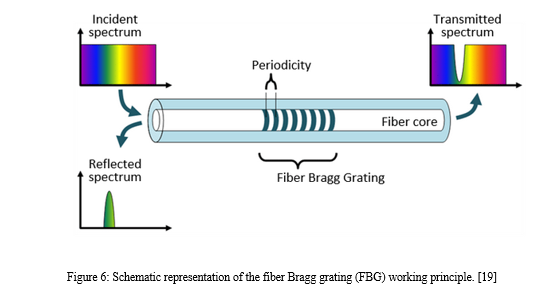A Brief Introduction to Fiber Optic Sensors and their Types with Circuit Diagram Application of Fibre Optic Intrusion Sensor Cables. Fibre optic sensors can be easily adapted for use in many sites. One of the most popular uses, outside of public sector contracts, is as part of business security systems. Fibre optics can help secure data centres, and communications infrastructure for software or communications companies and FiberPatrol FP1150 uses single-mode fiber optic sensor within telecommunications-grade cable. In addition to having a nominal service life of 25+ years, unused fibers within the cable can be used for other purposes, including networking and providing communications to other sensors and security devices installed along the perimeter. This is an area where fiber optic sensing technology can be utilized with high effect to increase security and response times. The basic idea of fiber sensing technology is to utilize optical fibers as distributed optical sensors to detect and monitor changes in temperature and strain in a fiber or detect vibrations (sound/acoustics) in the

The basic idea of fiber sensing technology is to utilize optical fibers as distributed optical sensors to detect and monitor changes in temperature and strain in a fiber or detect vibrations (sound/acoustics) in the environment around a fiber. When integrated into security and border monitoring systems, it's the acoustic sensing capability Wall-Top Applications. For walled perimeters, the FP1150 sensor cable is mounted at the top corners of the wall. Any impact to the sensor cable by an intruder's hands, feet, or climbing aid will be detected by the system. For the highest security, the sensor cable can be installed on both the inner and outer sides of the wall.

PDF Fiber Optic Sensors: Fundamentals, Principles & Applications Circuit Diagram
Fiber optic distributed acoustic sensing (DAS) is an ideal technology for physical security applications. With coverage distances in the tens of kilometers and the ability to detect, locate, and classify disturbances to within a few meters, DAS-based perimeter intrusion detection sensors protect critical infrastructure and high-value facilities around the world, including energy generation and

Based on Application. Fiber optic sensors based on application are classified into three types which are discussed below. Physical sensors. These sensors are mainly used for measuring physical properties such as stress, temperature, etc. Chemical sensors. These sensors are to measure pH, spectroscopic studies, gas analysis, etc. Bio-medical sensors Fiber optic intrusion detection sensors have emerged as an essential technology in modern security systems. Their unique features, such as sensitivity to environmental changes and immunity to electromagnetic interference, make them ideal for various applications. This article explores the primary applications of fiber optic intrusion detection

What To Look For in a Fiber Optic Sensor Circuit Diagram
Fiber Optic Sensors - Measurands/Applications 12/4/2014 4 • Temperature • Pressure, Force, Strain, Vibration • Displacement • Velocity • pH, Chemical Species • Radiation • Acoustic Field • Rotation, Acceleration • Magnetic/Electric Field Measurands Application Areas • Civil Engineering • Nuclear Power Industry Fiber Optic Sensors: Fundamentals and Applications September, 2015 David Krohn, Ph.D. Light Wave Venture LLC dkrohn@lightwaveventure.com 203-248-1475. Presentation Focus Fiber Optic Sensors Fundamentals and Applications, Fourth Edition, 2014 Available at www.spie.org -
